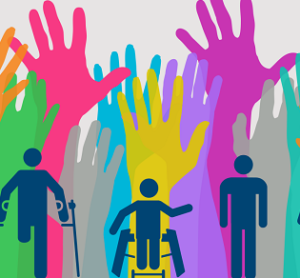The 2020 U.S. Census: We Need to be Counted
by Beth
 A couple reporters contacted me with questions about Census 2020 and its importance to people with disabilities. When they asked if I’d filled out the form on my own during the census ten years ago, I had to tell them no. “It wasn’t accessible,” I said with a shrug.
A couple reporters contacted me with questions about Census 2020 and its importance to people with disabilities. When they asked if I’d filled out the form on my own during the census ten years ago, I had to tell them no. “It wasn’t accessible,” I said with a shrug.
In 2010, the official census form every American received in the mail was not available in an accessible format. People who were blind or had visual impairments were told to ask someone we know to help us fill out a census questionnaire, visit a Questionnaire Assistance Center where a paid Census Bureau staff member could help us, or call a toll free number that was available between 8:00 a.m. and 9:00 p.m. 7 days a week.
My husband can see, and he filled out the form for us in 2010.
Today, on Census Day, I’m hoping to fill our form out on my own. You can do so too by visiting https://my2020census.gov. The 2020 Census Fact Sheet reports that the 2020 online questionnaire will follow the latest Website Accessibility Content Guidelines (WACG) and that Braille and large print guides can also be provided for those who prefer responding by U.S. mail.
Why do I care about all this? Why is it so important for me, a person with a disability, to be counted – especially while the world faces the impact of COVID-19? Here’s why:
- Transportation. My community uses census data when planning for public transit routes, upgrades and changes. Billions of dollars in federal funds are distributed for transportation projects, including public transit, accessible pedestrian signals, and truncated domes at intersections. I need all of those things to get around the city safely. The funding our state gets is based on census data. If I am not counted, that could mean less money for my city and state for these projects. I need to be counted.
- Health and Social Services. My state receives billions of federal dollars to support a wide variety of programs, including funding for services I use that are specifically for people with blindness and vision loss. I need to be counted.
- Representation. The number of people who respond in my community and state will determine the number of Electoral votes we get to help choose who becomes president, the number of seats our state gets in the U.S. House of Representatives, and how the congressional and state legislative districts are drawn. I need to be counted.
Yes. People with disabilities need to be counted. And this year, thanks to accessibility measures, I just might be able to see to that on my own.






